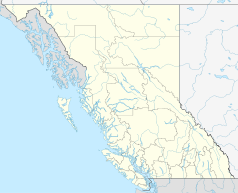Coquitlam
| Coquitlam | ||
|---|---|---|
 Coquitlam Skyline (City Center) |
||
| Location in British Columbia | ||
|
|
||
| State : |
|
|
| Province : | British Columbia | |
| Regional District : | Metro Vancouver | |
| Coordinates : | 49 ° 17 ′ N , 122 ° 48 ′ W | |
| Area : | 122.3 km² | |
| Residents : | 139,284 (as of 2016) | |
| Population density : | 1,138.9 inhabitants / km² | |
| Time zone : | Pacific Time ( UTC − 8 ) | |
| Postal code : | V3B - V3K | |
| Foundation : | 1891 ( Incorporated ) | |
| Mayor : | Richard Stewart | |
 Location in the Metro Vancouver area |
||
Coquitlam [ koʊˈkwɪtləm ] is a city in the Canadian province of British Columbia , in the greater Vancouver area on the Coquitlam River. The name comes from the language of the native Indians who originally lived there and means "little red fish".
Geographical location
The city of Coquitlam is located about 10-15 km east of Vancouver and is located on the Coquitlam River, which connects with the Fraser River and continues to the Coquitlam and Pitt Lakes. Coquitlam is bordered by Burnaby to the west and Port Moody to the southwest by New Westminster and Port Coquitlam to the southeast.
history
The first inhabitants of the region belonged to the coastal Salish , more precisely the Coquitlam (pronounced Kwayquilam). Although Simon Fraser passed the area in 1808, European settlement did not begin until the 1860s. The road between New Westminster and Port Moody not only connected the two cities, but also served to develop the region.
The granting of local self-government and thus the official foundation of the municipality took place on July 25, 1891 ( incorporated as a District Municipality ).
The small town initially prospered economically thanks to the wood boom, above all from the sawmills of Frank Ross and James McLaren, the Fraser Mills . However, in 1908 the place only consisted of 20 houses. In 1909, the two mill operators recruited 110 French Canadians from Québec, and more in 1910. This created the largest French-speaking community west of Manitoba. Soon Maillardville was founded, named after Edmond Maillard , an oblate .
Demographics
The census in 2016 showed a population of 139,284 inhabitants for the municipality, after the census in 2011 showed a population of 126,804 inhabitants for the municipality. The population has increased by 9.8% compared to the last census in 2011 and is thus well above the provincial average with a population increase in British Columbia of 5.6%. In the census period from 2006 to 2011, the population in the municipality had already increased by an above-average 10.4%, while the provincial average increased by 7.0%.
For the 2016 census, a median age of 41.1 years was determined for the municipality . The median age of the province in 2016 was 43.0 years. The average age was 40.2 years, or 42.3 years in the province.
climate
| Climate diagram | ||||||||||||||||||||||||||||||||||||||||||||||||
|---|---|---|---|---|---|---|---|---|---|---|---|---|---|---|---|---|---|---|---|---|---|---|---|---|---|---|---|---|---|---|---|---|---|---|---|---|---|---|---|---|---|---|---|---|---|---|---|---|
| ||||||||||||||||||||||||||||||||||||||||||||||||
As mostly in Metro Vancouver , the climate is more of a maritime climate . In the winter months, temperatures rarely drop below freezing. The average temperature in the winter months is 3 degrees Celsius. In spring, these rise to an average of between 9 and 12 degrees Celsius. In summer, temperatures between 13 and 23 degrees Celsius prevail, but they can rise above 30 degrees Celsius for several days and weeks.
Town twinning
-
 Laizhou , People's Republic of China
Laizhou , People's Republic of China -
 Ormoc City , Philippines
Ormoc City , Philippines -
 Paju , South Korea
Paju , South Korea
sons and daughters of the town
- Ken Aldcroft (* 1969), jazz and improvisation musician
- Garrett Burnett (* 1975), ice hockey and lacrosse player
- Craig Forrest (* 1967), football player (goalkeeper)
- Frederick Ledlin (born 1963), ice hockey player
- Mathew Barzal (born 1997), ice hockey player
- Dante Fabbro (* 1998), ice hockey player
Web links
- Coquitlam ( English, French ) In: The Canadian Encyclopedia .
- Website of the city of Coquitlam
Individual evidence
- ^ Origin Notes and History. Coquitlam. In: GeoBC . Retrieved August 1, 2012 .
- ^ Coquitlam Community Profile. Census 2016. In: Statistics Canada . November 16, 2017, accessed March 27, 2018 .
- ^ Coquitlam Community Profile. Census 2011. In: Statistics Canada . November 27, 2015, accessed January 12, 2016 .
